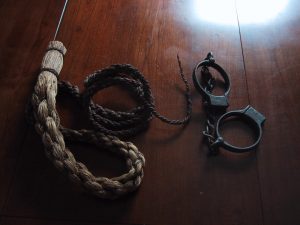An article I wrote, “Dear Ben Affleck, My Ancestors Were Slaveowners, Too” was published this morning.
I was contacted this past Wednesday by an editor with Zócalo Public Square, an L.A.-based not-for-profit that hosts live events and publishes daily humanities journalism. They describe themselves as an “ideas exchange” — their mission is to connect people to ideas and to each other.
 She wrote, “I’m hoping you’ll consider writing a piece for us. As you probably heard, Ben Affleck asked producers of the PBS documentary series “Finding Your Roots” to not reveal that his ancestors were slave owners. I thought it would be interesting to get a response from you — as a writer who has delved so deeply into the story of your family history …and as the head of an organization devoted to healing the wounds rooted in our nation’s history of slavery. I thought you could write an open letter to Ben Affleck that essentially tells him why it’s OK (and actually really good) to dig into one’s family history, even when it involves something as painful and horrible as slavery.”
She wrote, “I’m hoping you’ll consider writing a piece for us. As you probably heard, Ben Affleck asked producers of the PBS documentary series “Finding Your Roots” to not reveal that his ancestors were slave owners. I thought it would be interesting to get a response from you — as a writer who has delved so deeply into the story of your family history …and as the head of an organization devoted to healing the wounds rooted in our nation’s history of slavery. I thought you could write an open letter to Ben Affleck that essentially tells him why it’s OK (and actually really good) to dig into one’s family history, even when it involves something as painful and horrible as slavery.”
The article begins…
Dear Ben,
I’m certain being in the spotlight for not wanting the PBS show Finding Your Roots to include mention of your slave-owning ancestor has been a real pain. The unwanted headlines, the online comments, the “Dear Ben” letters must be getting old. I’m sure you want this whole episode behind you. I get that: I’m related to the most successful transatlantic slave-trading dynasty in U.S. history.
I thank you for your honesty in admitting you were embarrassed. Many white people, upon discovering enslavers among our ancestors, feel embarrassed, ashamed, and guilty. But as I learned from Will Hairston, a white descendant of one of the wealthiest Southern enslaving families in American history, “Guilt is the glue that holds racism together.”
I appreciate you writing on your Facebook page, “We deserve neither credit nor blame for our ancestors and the degree of interest in this story suggests that we are, as a nation, still grappling with the terrible legacy of slavery. It is an examination well worth continuing.”
Yes it is. And I can tell you from personal experience that what you choose to do next to continue that examination is what matters now.
You can read the full article here.

Remarkable Thomas. I’m in awe…